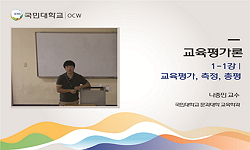비평이란 개념 속에는 이미 평가를 가지고 있다. 비평을 근간으로 하는 비평교육 역시 평가를 함의하고 있지만, 비평 활동 과정에서의 평가와 비평교육 평가 사이에는 상이점이 존재한다. ...
http://chineseinput.net/에서 pinyin(병음)방식으로 중국어를 변환할 수 있습니다.
변환된 중국어를 복사하여 사용하시면 됩니다.
- 中文 을 입력하시려면 zhongwen을 입력하시고 space를누르시면됩니다.
- 北京 을 입력하시려면 beijing을 입력하시고 space를 누르시면 됩니다.

비평교육 평가에 대한 소론 : 평가 방법을 중심으로 = An Essay about Evaluation of the Critical Education - focusing on evaluation methods
한글로보기https://www.riss.kr/link?id=A82593226
- 저자
- 발행기관
- 학술지명
- 권호사항
-
발행연도
2011
-
작성언어
-
-
주제어
비평교육 ; 평가 ; 평가 방법 ; 오독 ; 오해 ; the critical education ; evaluation ; evaluation method ; reading miscue ; misunderstanding
-
KDC
300
-
등재정보
KCI등재후보
-
자료형태
학술저널
- 발행기관 URL
-
수록면
159-178(20쪽)
- DOI식별코드
- 제공처
-
0
상세조회 -
0
다운로드
부가정보
국문 초록 (Abstract)
비평이란 개념 속에는 이미 평가를 가지고 있다. 비평을 근간으로 하는 비평교육 역시 평가를 함의하고 있지만, 비평 활동 과정에서의 평가와 비평교육 평가 사이에는 상이점이 존재한다. 비평은 비평 대상에 대한 평가만을 하지만, 비평교육의 평가는 비평교육을 수행하는 주체인 교사와 비평적 학습자, 비평교육 내용은 물론 동료 비평적 학습자와 비평교육에 대한 메타적 평가까지를 포함하고 있다. 문학교육이나 예술교육, 비평교육에서 겪는 평가의 어려움은 무엇보다 평가 방법의 곤란함에 기인한다. 대상에 대한 평가는 비평가의 주관이나 혹은 객관적이라고 인정된 시선만으로 이루어지지는 않기 때문이다. 과정 중심 평가가 도입되기 전까지는 교수-학습 시간에 활동한 결과물만을 평가하는 결과중심 평가법이 중심을 이루었었다. 이 방법은 교사 입장에서 평가를 손쉽게 할 수 있다는 점과 평가의 객관성을 높일 수 있다는 장점을 가지고 있으나, 교육 행위 일체가 평가의 대상이 되어야 한다는 교육 평가 철학을 근본적으로 훼손하고 있다는 지적과 학습자의 결과물 생성 과정을 지켜보지 않고서는 신뢰할 수 없다는 한계를 노정하게 되었다. 결과물을 만들기까지의 과정을 수행하는 학습자의 내면적 태도까지를 관찰하는 과정중심 평가법이 제시되었다. 그 가운데에서도 오독에 관심을 갖게 되었다. 오독에는 작자의 의도를 파악하지 못한 오류적 오독과 작가의 의도를 의도적으로 벗어난 창조적 오독으로 대별된다. 비평교육 과정에서의 오독은 매우 자연스러운 일이기에 오류적 오독을 넘어 창조적 오독으로 전이시키는 일이 비평교육 평가의 주된 작업이 된 것이다. 그러나 과정중심 평가법 역시 정의적 영역을 평가하는데 한계를 노정하였고, 과정과 결과가 일치하지 않을 경우에 어떻게 평가할 것인가에 대한 지적에서 자유롭지 못했다. 과정중심 평가법의 하나인 오독중심평가법과 결과중심 평가법을 결합한 탈중심 평가법을 본고에서는 제안하였다. 탈중심 평가법이란 교사 중심 혹은 학습자 중심, 과정 중심, 결과 중심에서 벗어나 이들 모두를 수용한 통합적 방법을 말하는데, 아직까지는 추상적 개념만 있을 뿐 구체적 방법 연구가 부족하여 이에 대한 논의가 필요하다.
다국어 초록 (Multilingual Abstract)
A meaning of critical involves evaluation and so does critical education. There are difference between evaluation of critical process and evaluation of the critical education. Criticism evaluate only a critical object, but on the critical education, t...
A meaning of critical involves evaluation and so does critical education. There are difference between evaluation of critical process and evaluation of the critical education. Criticism evaluate only a critical object, but on the critical education, teacher, learner, learning-mates and contents are evaluated. Evaluation on the literature education and the art education has difficulty for difficulties of evaluation method. Critical objects aren’t evaluated only by a critics view - subjective or objective. Before process-based evaluation method was introduced, result-based evaluation method which evaluated only results from learning activities was used mainly. It has merits that teacher evaluate easy and objective. But it was contrary to evaluation philosophy that all of educational activities were evaluated. And the result without educational process was not to be trusted. Process-based evaluation method was suggested to observe inner attitude of lerner who performed educational process to meet good results. Reading miscue is another method of process-based evaluation. Because reading miscue comes naturally in the critical education, as Paul de Man assert, it is main work to overcome misunderstanding and change into creative misunderstanding. But process-based evaluation has limit to evaluate affective domain and has problem what to do if process and result do not coincide. On this essay propose decentration evaluation method what combined reading miscue-based evaluation method with result-based evaluation method. Decentration evaluation method integrate with teacher-based, lerner-based, process-based and result-based evaluation method. For now, it is just a concept. It need to discuss about study of methods concretely.
목차 (Table of Contents)
- 〈국문요약〉
- Ⅰ. 들어가며
- Ⅱ. 비평교육의 평가
- Ⅲ. 나오며
- 〈참고문헌〉
- 〈국문요약〉
- Ⅰ. 들어가며
- Ⅱ. 비평교육의 평가
- Ⅲ. 나오며
- 〈참고문헌〉
- 〈Abstract〉
동일학술지(권/호) 다른 논문
-
크리스티나 로제티의 시 고블린 마켓(Goblin Market)에 대한 종교적 해석
- 부경대학교 인문사회과학연구소
- 손달례(Sohn, Dal-lye)
- 2011
- KCI등재후보
-
자유시간 여가활동 현황과 실체감/관계 강화 인식에 미치는 영향에 대한 연구
- 부경대학교 인문사회과학연구소
- 서운석(Suh Woon-Seok)
- 2011
- KCI등재후보
-
- 부경대학교 인문사회과학연구소
- 류진아(Ryu, Jin-A)
- 2011
- KCI등재후보
-
- 부경대학교 인문사회과학연구소
- 안영탁(Ann, Young-Tak)
- 2011
- KCI등재후보
분석정보
연관 공개강의(KOCW)
-

의료기술평가 연구방법론
K-MOOC 한국보건의료연구원 이월숙, 고려진, 설아람, 박지정, 최지은, 이민, 박은정, 박주연, 이나래, 윤지은, 손수경, 최미영, 최원정, 박동아, 신상진, 이현정, 김윤정, 최인순, 박찬미, 이자연, 조애정, 김윤희, 장수현, 박선영, 안정훈, 오성희 -

의료기술평가 연구방법론
K-MOOC 한국보건의료연구원 이월숙, 고려진, 설아람, 박지정, 최지은, 이민, 박은정, 박주연, 이나래, 윤지은, 손수경, 최미영, 최원정, 박동아, 신상진, 이현정, 김윤정, 최인순, 박찬미, 이자연, 조애정, 김윤희, 장수현, 박선영, 안정훈, 오성희 -

사회복지 프로그램 개발과 평가
한동대학교 전명희 -

프로그램 개발과 평가
나사렛대학교 석말숙 -

교육평가론
국민대학교 나종민




 KCI
KCI 스콜라
스콜라

